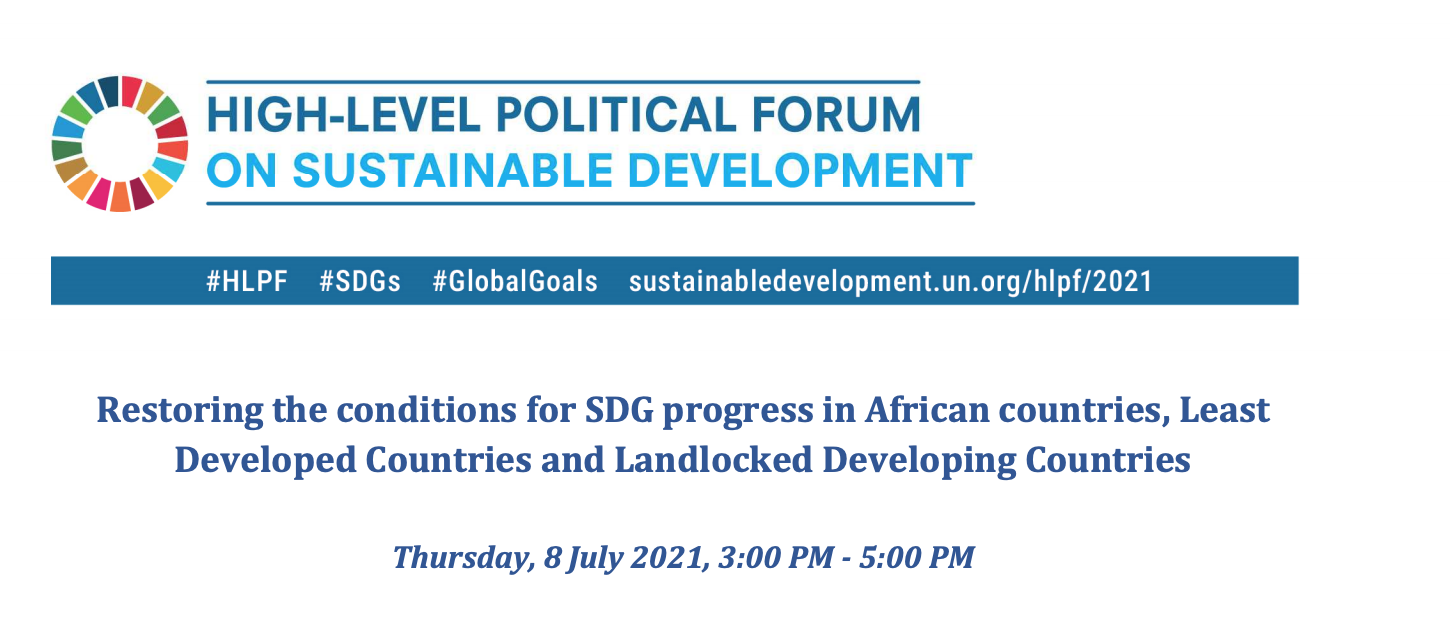Date: July, 8 2021
Time: 3:00 PM – 5:00 PM EDT
Location: Virtual event.
Register: This event requires registration, please register here.
While some progress has been made toward the SDGs in African countries, Least Developed Countries (LDCs) and Landlocked Developing Countries (LLDCs), even before the COVID-19 pandemic many countries were not on track to achieve the SDGs, and in some cases were regressing. The ongoing pandemic has exposed vulnerabilities and structural inequalities, adversely impacting human health, economies, and education. Debt levels are rising. Resilience is threatened by inequality and unemployment across populations. Social inequalities are widening, and disproportionately affecting women and girls. The pandemic has paralyzed key sectors including tourism, and the devastating effects of climate change are hindering recovery efforts.
LDCs and LLDCs are characterized by undiversified economies, weak public health services, low productive capacities, inadequate digital connectivity, and limited resources to mitigate the spread and impact of COVID-19. Of the 46 countries classified as LDCs, 33 of these are in Africa; half of the 32 LLDC countries are also located in this region.
While cases of COVID-19 had previously remained low in many of these countries, they are currently on the rise in Africa and in some LLDCs. Although the vaccine is starting to be distributed in many countries, rollout has been very slow. A minuscule proportion of vaccinations have been made in low income countries and a number of LDCs have not yet been able to begin vaccinating at all.
Both LDCs and LLDCs are severely affected by the global recession as a result of the pandemic, and many are in need of debt relief. Limited export diversification has heightened the vulnerability of LDCs to the impact of the pandemic on global trade. LLDCs have been impacted by cross-border restrictions and border closures, given their lack of direct access to seaports and dependency on transit transport to access international markets. Urgent and effective debt relief is needed, beyond debt servicing suspension. Bridging the digital divide is also more important than ever, to ensure a sustainable recovery and restore conditions for progress.
Preparations are currently underway in advance of the Fifth United Nations Conference on the Least Developed Countries (LDC5), which will convene from 23 to 27 January 2022 in Doha, Qatar, and is expected to adopt a new ambitious 10-year programme of action for the LDCs.
This session will address the challenges and opportunities common to these groups of countries amidst the pandemic and discuss the conditions necessary to overcome the socio-economic impacts of COVID-19 and embark on a track to realize the SDGs.
Proposed guiding questions:
- How can COVID-19 stimulus packages be designed and directed at supporting a sustainable and resilient recovery in Africa, and in LDC and LLDCs outside the region? How can they be bolstered by the international community?
- How could longer-term economic and fiscal policies and measures mitigate the social and economic effects of the pandemic, without increasing debt levels?
- What is being done to prioritize the needs of women, children, refugees, displaced persons, and other vulnerable populations? How are women and youth being engaged in sustainable recovery efforts?
- Where can we point to examples of innovative partnerships in critical sectors such as trade, investment, technology capacity building, food security, grants and concessional financing?
- What role can the UN play in ensuring a coordinated and comprehensive response to the ongoing crisis? How can we ensure access to the vaccine in these countries?
- What critical new commitments should be included in the outcome of LDC 5?
Chair:
H.E. Ms. Pascale Baeriswyl (Switzerland), Vice President of Economic and Social Council
Highlights:
Ms. Armida Salsiah Alisjahbana, Executive Secretary of ESCAP, presentation of regional dimensions
Interactive panel discussion
Moderator:
Mr. Courtenay Rattray, UN High Representative for the Least Developed Countries, Landlocked Developing Countries and Small Island Developing States
Panellists/Resource persons:
- H.E. Dr. Maha El Rabbat, WHO Director-General’s Special Envoy on COVID-19 Preparedness and Response, Former Minister of Health, Egypt
- Mr. Ali Al-Dabbagh, Deputy Director General of planning at the Qatar Fund for Development (QFFD)
- Ms. Sheila Oparaocha, Executive Director of ENERGIA International Network on Gender and Sustainable Energy
- Mr. Pa Ousman Jarju, Director of Green Climate Fund’s Country Programming Division
Lead discussants:
- Mr. Chiagozie Udeh, Global Focal Point SDG7 Youth Constituency
- Mr. Basiru Isa, Network of Indigenous and Local Communities for the Sustainable Management of Forest Ecosystems in Central Africa (REPALEAC) (Indigenous Peoples’ Major Group)
Respondents:
- H.E. Mr. Mukhtar Tileuberdi, Deputy Prime Minister and Minister of Foreign Affairs, Republic of Kazakhstan, Chair of LLDC Group
- H.E. Mr. Eisenhower Mkaka, Minister of Foreign Affairs of Malawi, Chair of the Group of LDCs
- H.E. Mr. Tandi Dorji, Minister of Foreign Affairs, Bhutan
- Ms. Margaret Kobia, Professor and Cabinet Secretary for the Public Service and Gender Affairs, Kenya
- Mr. Michael Lodge, Secretary-General of the International Seabed Authority (ISA)
For more information, visit this page.











Follow us on: